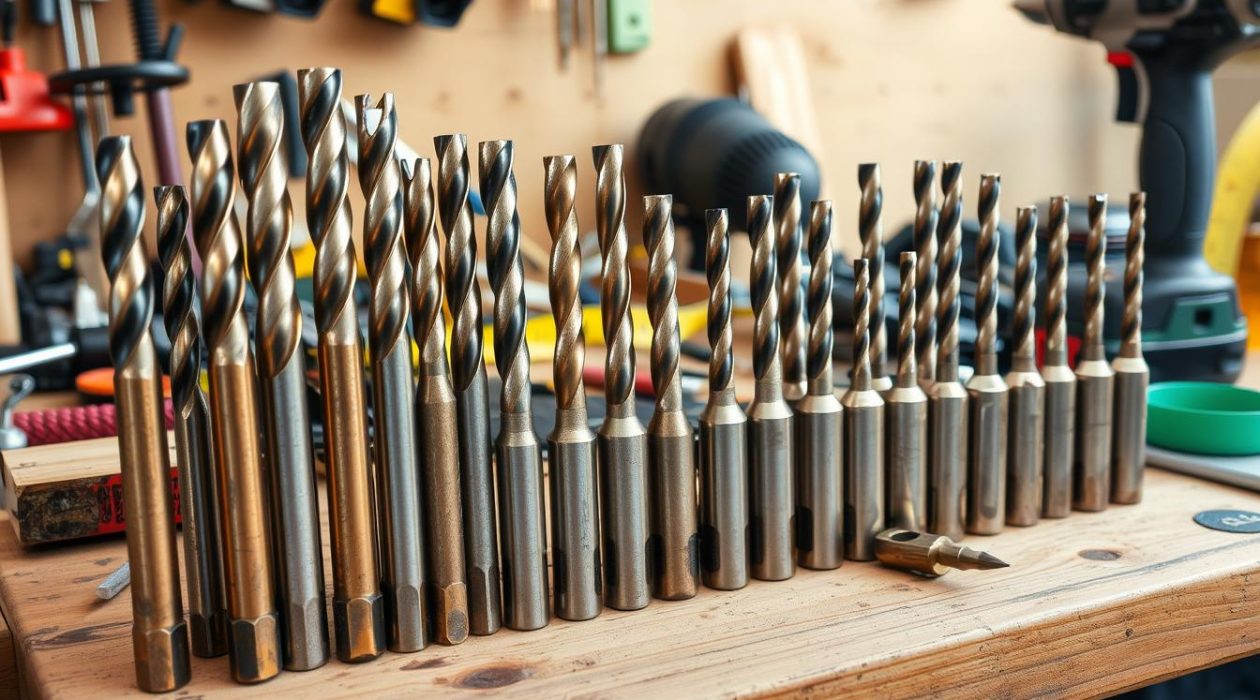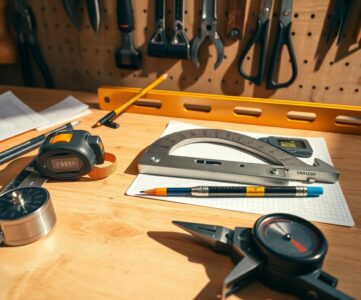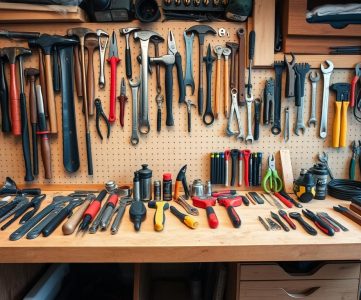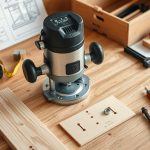Choosing the right drill bits for your projects can be daunting with so many options. Drill bits are key to any drilling task, and picking the right ones is crucial. It’s vital to know the basics and essential types to make smart choices.
Whether you’re a DIY enthusiast or a professional, understanding drill bits is essential. This knowledge helps you complete your projects efficiently. In this article, we’ll show you how to pick the perfect drill bits. We’ll cover the basics and offer tips on safe and effective use.
Key Takeaways
- Understanding the basics of drill bits is crucial for selecting the right ones for your projects.
- There are various types of drill bits available, each designed for specific materials and applications.
- Drill bits are a critical component of any drilling project, and selecting the perfect ones can make all the difference.
- Knowing how to use drill bits safely and effectively is essential for achieving your project goals.
- Choosing the right drill bits can help you work efficiently and effectively, regardless of your project’s complexity.
- Drill bits are designed for specific tasks, and using the right ones can help you avoid damaging your materials or equipment.
Understanding the Basics of Drill Bits
Choosing the right drill bit is key for a successful DIY project. Quality drill bits are crafted from materials like high-speed steel or tungsten carbide. These materials help them withstand the challenges of drilling.
Some common drill bit materials include:
- Steel
- Titanium
- Cobalt
Knowing about drill bit angles is crucial. It determines the type of hole you aim to create. By following these DIY drilling tips and selecting the right materials, you can achieve precise and efficient results.
Considering these factors helps you pick the perfect drill bit for your project. Whether you’re an experienced DIYer or new to the scene, grasping the basics of drill bits is vital for success.
Essential Types of Drill Bits Every DIYer Should Know
Choosing the right drill bits for your projects can be daunting with so many options. As a DIYer, knowing the different types of drill bits and their uses is key. This knowledge ensures you’re using the best drill bits for your DIY projects. Whether you’re working with wood, metal, or plastic, the right drill bit significantly impacts your work’s quality.
Common drill bits include twist bits, spade bits, and hole saws. Twist bits are versatile for drilling into wood, metal, and plastic. Spade bits excel at making large holes in wood. Hole saws are ideal for precise holes in various materials.
To pick the best drill bits for DIY, consider the material and project type. Here are key factors to keep in mind:
- Material: Different materials need different drill bits. For metal, use a harder material like cobalt or titanium.
- Project type: The project’s nature determines the drill bit needed. For woodworking, a sharp-pointed drill bit prevents wood splitting.
Understanding the different drill bits and their uses ensures you’re choosing the right ones for your DIY projects. Whether you’re an experienced DIYer or just starting, the right drill bits are crucial for quality work.
Matching Drill Bits to Your Material
Choosing the right drill bit is essential for successful drilling. Different materials demand specific drill bits to avoid poor results or tool damage. We will discuss the drilling needs for wood, metal, masonry, and plastic.
For wood, drill bits for wood have a sharp point and a straight or slightly curved edge. These are perfect for various wood projects, from furniture to deck building. Important DIY drilling tips for wood include using a sharp bit and applying steady, consistent pressure.
Wood Drilling Requirements
- Use a sharp drill bit to avoid splintering the wood
- Apply steady, consistent pressure to maintain control
- Use a drill bit with a straight or slightly curved cutting edge
Metal Drilling Specifications
Metal drilling needs a drill bit made to handle metal’s hardness. These bits are tougher and have a more aggressive edge.
Masonry and Concrete Applications
Drilling into masonry or concrete requires specialized bits. These are diamond-coated and designed for hammer drills.
Plastic and Composite Materials
Drilling plastic or composite materials needs a bit that won’t melt or deform. These bits are sharp, have a straight edge, and work well at high speeds.
| Material | Drill Bit Type | Tips |
|---|---|---|
| Wood | Drill bits for wood | Use a sharp bit, apply steady pressure |
| Metal | Metal drill bits | Use a tougher material, more aggressive cutting edge |
| Masonry/Concrete | Masonry drill bits | Use a diamond-coated cutting edge, hammer drill |
| Plastic/Composite | Plastic drill bits | Use a sharp point, straight cutting edge, high speed |
Size Matters: Selecting the Right Drill Bit Diameter
Choosing the right drill bit sizes is essential for DIY projects. The diameter of your drill bit affects the hole size you aim for. With numerous drill bit sizes out there, picking the correct one can be daunting. Consider the material you’re working with and the hole size you need.
For most DIY tasks, a set of best drill bits for DIY with various sizes is necessary. Start with a set that includes 1/16, 1/8, 1/4, and 1/2 inch drill bits. This range allows for flexibility with different materials and hole sizes.
- Consider the type of material you are working with (wood, metal, masonry, etc.)
- Think about the desired hole size and adjust your drill bit size
- Use a drill bit that matches your drill’s speed and power
By choosing the right drill bit sizes and following these tips, you’ll complete your DIY projects efficiently and accurately. Always opt for the best drill bits for DIY for superior results.
Specialty Drill Bits and Their Uses
Working with various materials demands the right tools. Specialty drill bits are crafted for specific tasks, ensuring professional results. Whether tackling wood, metal, or plastic, there’s a drill bit for every need.
Common drill bits include spade, Forstner, and step bits. These are made for precise holes in metal and other materials. For example, spade bits excel in woodworking, while Forstner bits are best for clean wood holes.
Spade Bits for Woodworking
Spade bits are tailored for woodworking. Their flat, spade-like design facilitates easy drilling and clean holes. They’re great for screw, dowel, or fastener holes.
Forstner Bits for Clean Holes
Forstner bits are designed for wood holes. Their unique shape ensures precise drilling and a smooth finish. Ideal for screw, plug, or other clean hole applications.
Step Bits for Sheet Metal
Step bits are for sheet metal drilling. Their stepped design makes drilling easy and clean. Perfect for screw, rivet, or fastener holes in sheet metal.
Proper Care and Maintenance of Your Drill Bits
Proper drill bit maintenance is crucial to extend your drill bits’ lifespan and maintain their performance. Regular cleaning and proper storage significantly enhance their longevity. By adhering to a few straightforward DIY drilling tips, you can ensure your drill bits remain in optimal condition.
To maintain your drill bits, begin by cleaning them after each use. Utilize a soft brush or cloth to remove debris or dust. Store your drill bits in a dry location, away from direct sunlight. Here are some additional tips to keep in mind:
- Regularly inspect your drill bits for signs of wear and tear
- Use a drill bit sharpener to keep your bits sharp and effective
- Avoid using your drill bits for tasks they are not designed for
By adhering to these DIY drilling tips and prioritizing drill bit maintenance, you can ensure your drill bits remain in good condition. Always handle them with care and store them properly to extend their lifespan.
Signs It’s Time to Replace Your Drill Bits
For both DIY enthusiasts and professionals, knowing when to replace drill bits is crucial. Drill bits wear out over time, affecting performance and safety. We will discuss the indicators that suggest it’s time for a new drill bit.
Wear Indicators
Visible wear is a clear sign that your drill bit needs replacement. Look for chipping, cracking, or excessive rust. If you spot these signs, it’s time to choose the best drill bits for your DIY projects.
Performance Issues
Drill bit performance decline is another indicator. Look out for increased vibration, slower drilling speed, or trouble drilling through materials. A new drill bit can greatly improve your drilling experience. Thus, selecting the right drill bit is key to a successful project.
Safety Concerns
Worn-out drill bits can be dangerous. A dull or damaged bit can cause your drill to slip or bind, leading to accidents. To avoid these risks, replace your drill bits regularly. Choose high-quality drill bits that prioritize safety and performance.
Recognizing the need for drill bit replacement ensures your safety and work quality. Always opt for the best drill bits for DIY projects to achieve efficient and effective results.
| Signs of Wear | Performance Issues | Safety Concerns |
|---|---|---|
| Chipping, cracking, or rust | Increased vibration, reduced speed | Slipping or binding of the drill |
| Excessive wear on the cutting edge | Difficulty drilling through materials | Potential for accidents and injuries |
Essential Safety Tips for Using Drill Bits
Drill bit safety is paramount in any DIY drilling endeavor. It’s crucial to prioritize safety to prevent accidents and injuries. Always wear personal protective equipment, such as safety glasses, gloves, and a dust mask. This gear shields you from debris, dust, and other hazards.
Choosing the right speed is also key for drill bit safety. The correct speed setting for your drill bit and material prevents overheating, which can damage or break the bit. Avoid excessive pressure, as it can cause the drill bit to slip or bind. By adhering to these DIY drilling tips, you ensure a safe and successful drilling experience.
Common Safety Mistakes to Avoid
- Not wearing personal protective equipment
- Using the wrong speed setting for the material
- Applying too much pressure
- Not maintaining the drill bit properly
Awareness of these common safety mistakes is crucial. By avoiding them, you can ensure a safe drilling experience. Always follow drill bit safety guidelines and take necessary precautions to protect yourself and others. With the right safety tips and DIY drilling tips, you can complete your project with confidence and accuracy.
| Drill Bit Type | Safety Tip |
|---|---|
| Wood Drill Bits | Use a slow to medium speed setting |
| Metal Drill Bits | Use a medium to high speed setting |
| Masonry Drill Bits | Use a slow speed setting and apply gentle pressure |
Pro Tips for Extended Drill Bit Life
Extending the life of your drill bits can save you money and ensure you always have the right tools for your projects. Proper drill bit maintenance is essential to get the most out of your drill bits. This includes storing them in a dry place, cleaning them regularly, and checking for wear and tear.
When choosing the best drill bits for DIY projects, consider the type of material you will be working with. Different materials require different types of drill bits. Using the right one can significantly improve the quality of your work. Here are some tips to help you extend the life of your drill bits:
- Store your drill bits in a protective case to prevent damage and rust.
- Clean your drill bits regularly to remove debris and residue.
- Check your drill bits for wear and tear, and replace them when necessary.
By following these tips, you can extend the life of your drill bits and ensure they continue to perform well. Always choose the right drill bit for the job. And, take proper care of your drill bits to get the most out of them.
Where to Buy Quality Drill Bits
Choosing where to buy quality drill bits is crucial. You face a dilemma between online stores and local hardware shops. Each option has its advantages and disadvantages, influencing your decision.
Online stores boast a vast array of drill bits, accompanied by customer feedback. They often provide competitive prices and the convenience of shopping from home. In contrast, local hardware stores allow you to physically inspect the drill bits. Their staff can also offer valuable advice and guidance.
Online vs. Local Stores
Amazon and Home Depot are well-known online destinations for drill bits. They offer a broad selection and customer reviews. Ace Hardware, a local hardware store, also carries a variety of drill bits and provides expert advice.
Price Range Considerations
Drill bit prices vary widely, influenced by type and quality. Your budget and project requirements should guide your purchase. Here are some price ranges to consider:
- Basic drill bits: $5-$20
- Mid-range drill bits: $20-$50
- High-quality drill bits: $50-$100
Warranty Information
Warranty is another critical factor when buying drill bits. A robust warranty offers assurance and safeguards your investment. Look for brands like Bosch or DeWalt, known for their comprehensive warranties.
Conclusion: Making the Right Choice for Your Drilling Needs
Choosing the right drill bits is key to successful drilling. This guide has shown the importance of understanding different types, materials, and applications. The right choice can greatly improve your work’s quality.
Whether you’re an experienced DIYer or new to the scene, investing in quality drill bits from brands like DeWalt, Bosch, or Makita is wise. It can enhance your projects and ensure long-lasting performance. Always consider the material, hole size, and any special needs before selecting.
With the tips from this article, you’re ready to choose the best drill bits for your DIY projects. Happy drilling and enjoy the satisfaction of a job well done!




